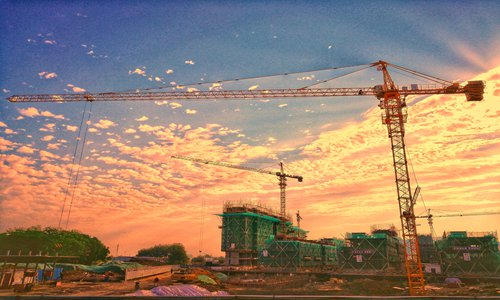SOURCE / INDUSTRIES
Chinese property firms adopt livestreaming, VR technology to promote sales amid virus onslaught

A real estate construction site in Wuhu, East China’s Anhui Province in May 2018 Photo: VCG
China’s real estate companies, which took a great hit from the novel coronavirus pneumonia (NCP) outbreak, have recently geared up for online promotions, offering apartment views via virtual reality (VR) technology and livestreaming.
As local housing authorities have required China's major real estate companies to shut sales centers and many cities have halted construction or postponed work resumption in a bid to control the spread of the virus, many domestic housing companies such as Poly, Midea Real Estate and China Jinmao have launched online services such as consultancy, VR apartment tours and price calculation.
“Starting in late January, we suggested our customers try apartment viewing through VR technology, which is more convenient and safe,” said an agent surnamed Li with Lianjia, China's biggest real estate chain.
“There is no need for would-be buyers and agents to view homes on the spot during this special period. We can introduce apartments for them via voice call at the same time and many of my customers accept the new way,” Li, who is based in Beijing’s Chaoyang district, told the Global Times on Tuesday.
Li said that his team is studying and preparing livestreaming to introduce homes for their customers.
“I have planned to buy an apartment since late December and tried the VR apartment tour on several platforms such as Lianjia and 58.com,” a Beijing-based resident surnamed Liu told the Global Times.
“Such a new channel is kind of a contingent measure for the domestic housing market given the viral epidemic and it still takes some time to bring home sales online because the live experience is vital and many other factors like the environment and supporting facilities in the community also matter,” Liu said.
The China Real Estate Association (CREA) said Thursday in a notice that it encourages the sale of commercial homes through online platforms to help contain the coronavirus spread. The CREA also suggested that a number of Chinese property websites support online sales.
Apartment VR tours on online property information providers 58.com and anjuke.com rose 57.7 percent month-on-month in January, and Beijing reported the largest increase of 76.3 percent, followed by 72.7 percent in Haikou, South China’s Hainan Province, with a rise of 70.8 percent of Taiyuan, North China’s Shanxi Province, according to an industry report.
Users in large cities such as Guangzhou and Shenzhen in South China’s Guangdong Province, Changsha in Central China’s Hunan Province and Suzhou in East China’s Jiangsu Province have strong demand for online apartment tours, the report said.
“Online home sales will become a trend in the future. Many secondhand homes are traded via online platforms nowadays. Though it is irreplaceable for new home buyers to view homes offline, some procedures such as subscription and contract signing can be completed online,” Li said, noting that thanks to fierce competition in the Chinese market, more housing developers will seek online promotion.
“But there were no transactions in February,” Li said, noting that “what my customers care more about now is the epidemic and their own health conditions. [They are] not in a hurry to buy an apartment at this moment.”
“The virus has cast a shadow over the property market in large and small cities. Wuhan, [the epidemic center in Central China’s Hubei Province], will be hit hard and other first-tier cities such as Beijing and Shanghai will also feel the effects in the first quarter,” said Yan Yuejin, research director at E-house China R&D Institute.
“Housing transactions across China will fall on monthly and yearly basis in February and the drop is likely to reach more than 50 percent in both terms,” Yan forecast, adding that it will be hard for the sluggish market to see a rebound by mid February.
“But the domestic property market is not likely to slow down continuously,” Yan told the Global Times on Tuesday, noting that there would be government stimulus polices to help maintain sound growth of the industry.
